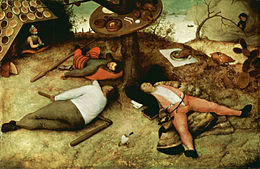
| Part of a series on |
| Utopias |
|---|
 |
| Mythical and religious |
| Literature |
| Theory |
| Concepts |
| Practice |
|
Cockaigne or Cockayne (/kɒˈkeɪn/) is a land of plenty in medieval myth, an imaginary place of luxury and ease, comfort and pleasure, opposite to the harshness of medieval peasant life.[1] In poems like The Land of Cockaigne, it is a land of contraries, where all the restrictions of society are defied (abbots beaten by their monks), sexual liberty is open (nuns flipped over to show their bottoms), and food is plentiful (skies that rain cheese). Cockaigne appeared frequently in Goliard verse. It represented both wish fulfillment and resentment at scarcity and Christian asceticism.
Cockaigne was a "medieval peasant’s dream, offering relief from backbreaking labor and the daily struggle for meager food."[2]
- ^ Chisholm, Hugh, ed. (1911). . Encyclopædia Britannica. Vol. 6 (11th ed.). Cambridge University Press. p. 622.
- ^ "New York Public Library: Utopia". Utopia.nypl.org. Archived from the original on 2012-07-16. Retrieved 2012-10-02.